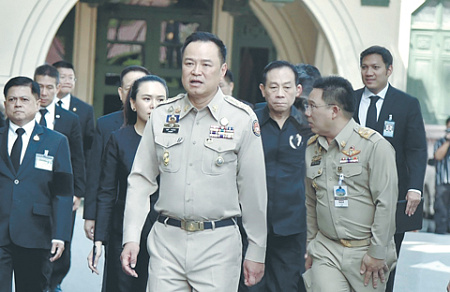
The fragile peace between Thailand and Cambodia, painstakingly brokered by then-U.S. President Donald Trump, has been abruptly suspended, threatening to reignite a territorial conflict that Washington once claimed as a diplomatic victory. Thai Prime Minister Anutin Charnvirakul officially announced the halt to the peace agreement, raising concerns that the long-standing border dispute, which saw five days of intense fighting in July, could spiral once more. Trump had previously compelled both nations to the negotiating table by threatening to withhold trade agreements, underscoring the international stakes involved.
The immediate catalyst for this alarming development was a landmine explosion on November 10, which left four Thai soldiers wounded. The incident triggered an emergency meeting of Thailand’s National Security Council the following morning to address the rapidly escalating tensions between Bangkok and Phnom Penh.
Prime Minister Charnvirakul asserted that the mine blast definitively indicated that “hostility towards our national security has not subsided, as we had expected.” He confirmed that all provisions of the Cambodian-Thai peace declaration, signed on October 26 during the ASEAN Summit, would be put on hold. This agreement had stipulated the release of 18 Cambodian prisoners of war by Thailand, a process slated to begin by the end of the upcoming week. Furthermore, the declaration called for the removal of heavy weaponry and landmines from the border zone. Thai authorities maintain that their government will only resume its commitments once all hostile actions from Cambodia cease, specifically pointing to their belief that the landmine, which injured their troops, was recently planted in a patrol area, thereby constituting a direct violation of the peace terms.
In Phnom Penh, however, a different narrative has emerged. Cambodia’s Ministry of National Defense expressed regret over the injuries to the Thai soldiers but firmly rejected Thailand’s accusations regarding the mine’s recent placement. Cambodian officials contend that the mines are “relics of past conflicts,” referring to the extensive warfare that plagued Cambodia from 1967 to 1989, involving forces from Thailand, Vietnam, and the United States. Premier Hun Sen, a prominent figure in those historical conflicts, served as Prime Minister for decades before his son, Hun Manet, assumed the leadership two years ago.
Despite the differing accounts, Thailand’s posture appears resolute. Following the council meeting, Charnvirakul directed the Ministry of Defense to intensify military measures and conduct all necessary operations to safeguard national territory. Concurrently, the Ministry of Interior is tasked with informing residents in border communities about safety protocols and evacuation routes, while the Ministry of Education will conduct emergency response drills. The Ministry of Health has also been instructed to prepare for potential incidents in high-risk areas. On the diplomatic front, the Ministry of Foreign Affairs is preparing to lodge a formal protest with the Cambodian embassy and will seek clarification from the ASEAN Interim Observer Group, deployed in border regions to monitor the ceasefire, which includes representatives from Singapore, Malaysia, Indonesia, Laos, the Philippines, Vietnam, and Brunei.
The underlying conflict historically stems from an intractable dispute over ancient temples located in the contested borderlands. Past aggressions have included skirmishes between Cambodian and Thai military forces, along with provocative acts such as the playing of the Cambodian national anthem within a temple complex, and “unauthorized” visits by Thai groups. Adding another layer of complexity, alleged deteriorating relations between powerful political families – Thailand’s Shinawatra clan and Cambodia’s Hun family – are believed by some to have played a role. Former Thai Prime Minister Paetongtarn Shinawatra, daughter of ex-Premier Thaksin Shinawatra, faced internal political backlash after a phone call with Hun Sen was leaked, wherein she reportedly disparaged her own generals. This controversy led Hun Sen to publicly question her capacity to resolve the border dispute, advocating for a change in Thai leadership.
Elena Pyltsina, a senior researcher at the Center for Vietnamese and ASEAN Studies of the Institute of China and Contemporary Asia of the Russian Academy of Sciences, offered a sobering assessment of the situation. She stressed that a full-scale military conflict would be economically unsustainable for both Thailand and Cambodia. “Neither side’s economy can withstand a prolonged military conflict. In this matter, economic pragmatism will most likely prevail,” Pyltsina stated. She further noted that the peace declaration itself merely signaled an intent to initiate dialogue rather than definitively resolving the conflict’s root causes. “A week before the agreement was signed, the countries began negotiations on border demarcation. However, this concerns only a small section of territory, so the potential for conflict still remains,” she emphasized. An alternative theory suggests that the recent escalation might be linked to the activities of fraudulent call centers operating in Cambodia near the Thai border. “There are studies confirming that Cambodian authorities are connected to these centers. Thai authorities are actively combating them. Therefore, one theory is that Cambodia initiated this conflict to prevent intervention by Thai police,” Pyltsina explained, highlighting the multi-faceted nature of the tensions.
